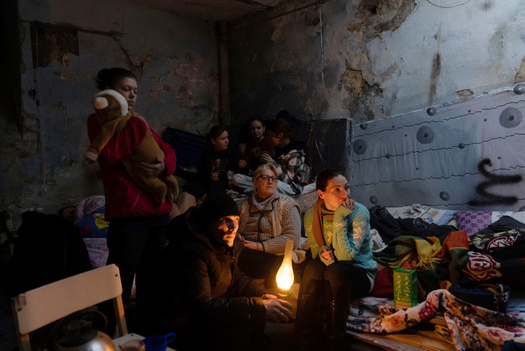
‘We were lucky. Only two mortar shells hit our house’ A survivor of the siege of Mariupol tells the story of his family’s escape
Мы говорим как есть не только про политику. Скачайте приложение.
Mariupol has been under siege for more than three weeks. More than 200,000 civilians remain trapped in the city, despite repeated attempts at evacuations. According to the Ukrainian authorities, around 20,000 Mariupol residents managed to flee through a humanitarian corridor on March 15. But a lucky few managed to get out of the city even earlier. Meduza spoke to one such person: Alexey, whose name has been changed for security reasons, was born and raised in Mariupol. In recent years, he’s been living in Kyiv, but he returned to his hometown on February 24, to celebrate his grandmother’s birthday. That same day, Russia launched a full-scale invasion of Ukraine and Alexey ended up trapped in besieged Mariupol for almost three weeks. He escaped the city along with his parents and 10-year-old sister on March 14. Here’s how he and his family survived.
Please note. This story was first published in Russian on March 16, 2022.
Alexey
23-year-old engineer working in Kyiv. Born and raised in Mariupol. His name has been changed.
On February 24, I woke up really early because of how cold it was on the train. We were stopped at some small station not far from Volnovakha. There was an order to hold the train because of bombings up ahead. We waited for several hours.
Finally, they let us pull in to Volnovakha, but we weren’t allowed to disembark — they were afraid that the Russian troops would arrive soon. The train stood there a while, and then, in the end, we were allowed into Mariupol. When I got off the train, I could already hear explosions on the outskirts of the city. There were journalists running around with cameras, but nothing terrible had happened yet.
At first, it felt like 2014 all over again. Back then, they bombed the outskirts of Mariupol a little bit and then everything quieted down pretty quickly. But compared to what’s happening now, 2014 was like a light breeze. Businesses were still open, the city center was intact, there were no aircraft or bombs. It wasn’t a full-on war back then.
On February 26, my grandmother turned 70. We actually managed to celebrate: we drank champagne and ate the last of our salami at my parents’ apartment to the sounds of explosions. After a couple of days with us there, she decided to go back to her own house. She lives on the outskirts of the city. We tried to talk her out of it, but she dug her heels in and flat out refused to stay. At the point, it was still unimaginable that we’d be under siege, so we let her go. We haven’t had any contact with her since.
Until March 4, our lives were basically normal. We heard explosions periodically, but they were far away. We could have gone on waiting as long as we had gas, water, and electricity. Even just gas would have been enough, then you can heat water and make food. But on March 4, everything disappeared: communications, heat, water, and gas. The siege began.
The first thing I had to do was pass through the infamous five stages of accepting the unavoidable. That took, like, two or three hours. Then survival mode kicked in and we started establishing our new way of life. It consisted of standing in line for water, carrying the water, and cutting firewood.
We had to carry a whole lot of water. It takes six liters [1.6 gallons] just to flush the toilet. Plus, the city’s water is drying up. The dams that directed the river into the city have been destroyed so the water is really shallow now.
The river water is not safe for drinking and cooking. There’s no drinking water in Mariupol, it’s all imported. After we drank all of the bottled water, we had to go to the well, like it was the nineteenth century. In order to draw water from the well, you had to wait in a huge line for like three hours. No matter when you got there, there were always 70 or 80 people already waiting. That was at the church well where the water is cleaner. At other wells, where it’s less clean, there could be 30 or 40 people, but it would still be a long wait.
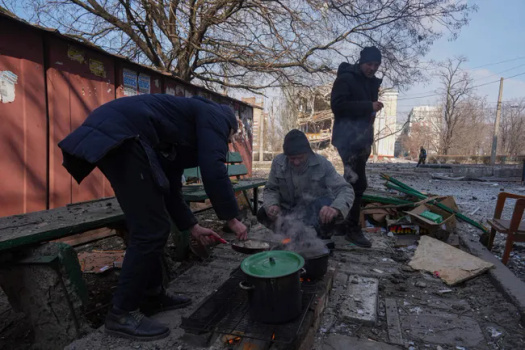
Then the water has to be boiled because it’s cloudy and smells like pond scum. I’ll remind you that there’s no gas. You could only do it over a fire. We cut down the trees in the courtyard and then my father and I chopped them up for firewood. Making tea took six hours. We also did our cooking on that fire. It's just like at home, except that cooking buckwheat takes 40 minutes instead of 10.
We quickly got used to tending a fire and cooking on it and more or less made peace with that life, but then the [large scale] shelling started. We were lucky: during that whole time only two mortar shells hit our house. One landed on the staircase between the eighth and ninth floors, so now there's just a chunk of the building missing there. The windows were broken in all of the neighboring apartments, but all the people seem to have survived. Another shell hit the first floor and, that time, two people were killed.
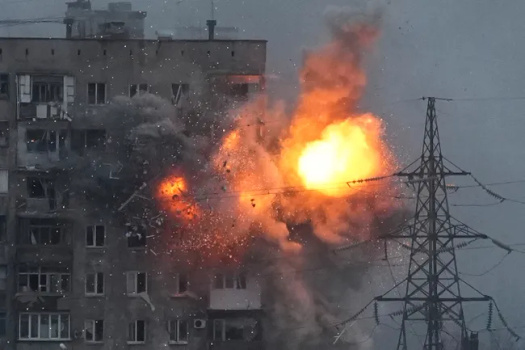
There haven’t been any municipal services for a long time now. No ambulances, no fire department. The remaining police officers came around and told us to leave the bodies out in the courtyard and cover them with something. We’re not allowed to just bury them ourselves, that’s a whole legal process. Those two corpses were still laying out there when we were leaving. Good thing it’s been so cold so far this spring.
We lived on the right bank [of the Kalmius river], in the Kirov neighborhood, and I haven’t heard of there being any mass graves around there. All I know is that local Christian denominations are burying their own people. And that there could be more corpses on the left bank. I don’t know what’s happening over there, people are saying a lot of different things. Some people say that the Russian Army occupied that zone a long time ago, opened humanitarian corridors, gave out SIM cards, and everything is just hunky dory. Others say that they’re eating the old people. It feels like left bank got hit harder. All we could see over there from our windows was fire and smoke.
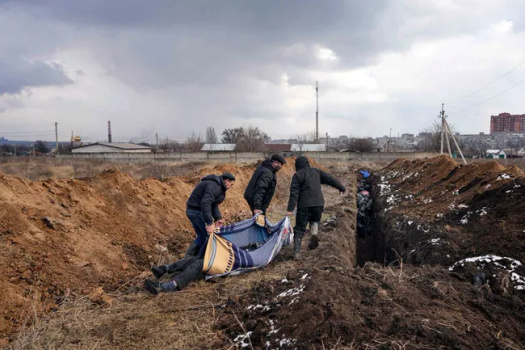
There was no cell service at all from March 4 to 14. Some people said that if you went downtown and climbed to the top of a blown-out high rise, you could catch a bit of a signal, but I didn’t particularly believe them and I never checked. We didn’t have heat, either. This is the coldest spring we’ve had for a while, some nights, it’s gone down to -9 degrees Celsius [15 degrees Fahrenheit]. We put on all the clothes we had and slept under three blankets. That’s how we we kept warm.
Tons of people's homes have burned down. From my window, I could see a neighboring building that had been hit by a giant bomb. The building caught fire and there was no one to put it out. After a couple of days, it completely burnt down. Now it’s totally black. I’ve seen four buildings like that and dozens more that are fire damaged. People had nowhere to go. They huddled in basements, hoping to sit and wait things out. There were people hiding in the basement of a school by our house. But then the school was bombed and it broke through the foundation and basement, too.
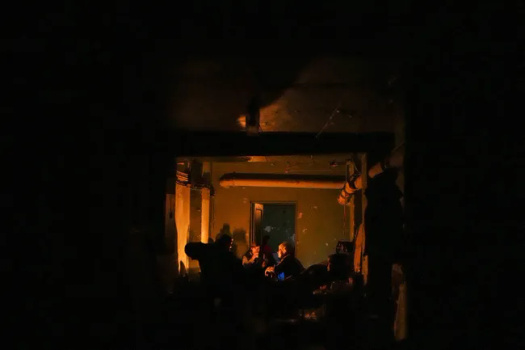
My family and I didn’t hide in the basement. We lived on the eighth floor, they wouldn’t shoot that high up with their machine guns, and if a shell hit us — well, it would kill us, but what difference would that make at that point? Six shells fell right near us but they didn’t get us. I’m thankful for that. You wake up in the morning, you see the fresh craters, and you think “Guess I’m alive. And that’s great.”
At some point, our army started breaking into the stores. They took meat, phones, and portable phone chargers. Then everyone else followed suit. Before that, I didn’t see anyone smashing windows and breaking in themselves. Our people are like that —they’re fatalists, they accept their fates with a sense of duty and humility. But now that the authorities are doing it, why shouldn’t we help ourselves? It’s not like these places will be turning profits anytime soon.
People looted expired meat, cheese, milk, beverages. Local Roma were among the first to score, they took almost all the cigarettes and alcohol and started selling them at insane prices — 200 hryvnias for a pack of cigarettes! People also broke into pharmacies. I managed to get some painkillers, some anti-inflammatory drugs, and bandages.
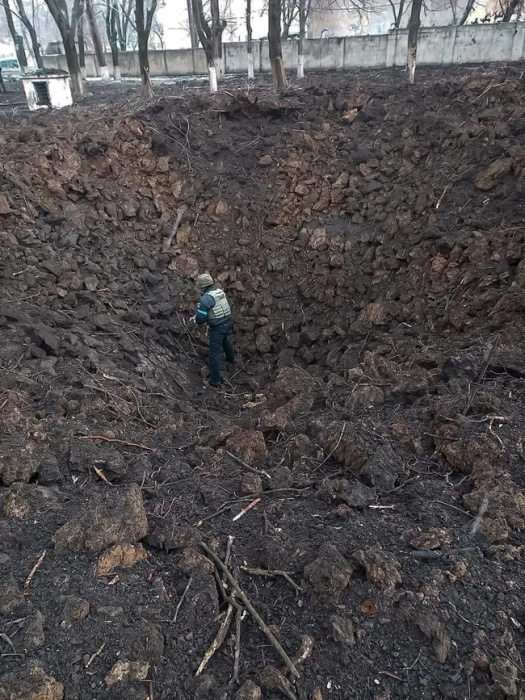
All in all, we didn’t really go hungry. Even in the first days of panic, I managed to grab some buckwheat, rice, and condensed milk. We also tried to keep our spirits up. We had to stay cheerful and continue to be doing something. Things aren't as scary when you are cutting down a tree.
One day, my father and I went to the market for cooking oil. A merchant had some left in his basement, and now he was selling it for three times the prewar price. There was nothing we could do, so we bought it. On the way back, we saw a Ukrainian tank. We didn’t think much of it at first, they’ve been rolling back and forth under our windows every day. But then suddenly it started to shoot! We realized that if it was shooting at something in our direction, we might get caught in the crossfire. So we got out of there.
I personally didn’t see any Russian soldiers or tanks, but there were a ton of planes. They flew over us practically every half hour. Whenever they dropped a bomb, our whole building would shake from the shock wave: left-right, right-left. It was like that 15–20 times a day.
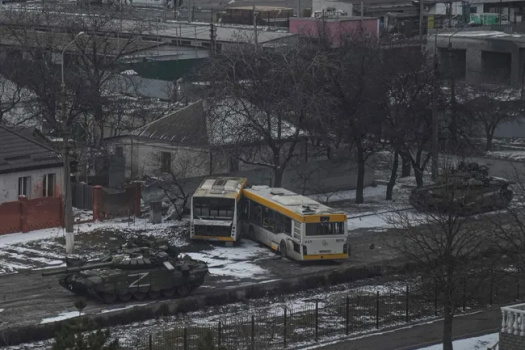
We tried to leave the city twice when we got word of humanitarian corridors. But both times, Ukrainian soldiers turned us back.
I don’t rule out that they may have been using us as human shields. While we were still in the city, Mariupol was bombed by some kind of mortars. If we hadn’t been there, maybe they would have brought in something more powerful. Nobody has time to care about us civilians during a war. We are literally trapped between two fires: one side shoots at us and the other, whether they like it or not, uses us as their shields.
On March 14, we learned that a Ukrainian checkpoint had been blown up on the highway leading to Manhush [a settlement southwest of Mariupol]. My brother told us about it. He came in through there from the village of Melekine just to tell us. He himself had found out from somebody else. That’s the only way news like that travels these days. Our car was in the garage, we hadn’t been driving it because we were saving gas. We quickly tossed our warm things, electronics, and documents in it and sped away. We left the keys to our apartment with the neighbors so that if a shell hits it and starts a fire they can put it out.
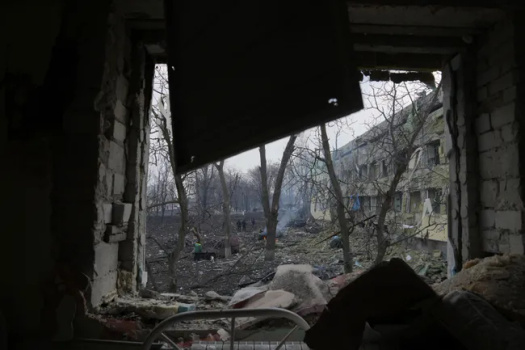
The checkpoint looked like had been hit by a bomb or artillery fire. All the equipment around it was completely burnt out and there was nobody left alive. Just blown up corpses. We were driving and then we see just some legs on the side of the road. Further on, there was a head.
My family and I are in Melekine now. It’s a village 30 kilometres [19 miles] outside of Mariupol, and our dacha is here. I think we’ll stay for a while. We don’t have any gas anyway and there’s nowhere to buy it anywhere around here. But we have enough gas for the house, and food and water to last us a week and a half. Maybe even for two weeks if we tighten our belts. There’s been no bombing here, only the sound of explosions sometimes. We’ve also heard that there’s a pig farm nearby where they’re selling meat. They don’t have any more feed for them so they’re slaughtering the pigs. Maybe things will quiet down in a little while and they’ll at least deliver gasoline or allow transport through.
We don’t have any hopes of returning to Mariupol. The city essentially no longer exists, there are basically no undamaged buildings. On the way to the checkpoint, we went through downtown: it was totally razed by the aerial bombings. The bombs take down everything in a 10-meter [33-foot] radius and leave behind huge craters, 15 meters [50 feet] wide and four meters [13 feet] deep. Everything is covered in shards, wires hanging, shells sticking up out of the pavement, rubble strewn everywhere.
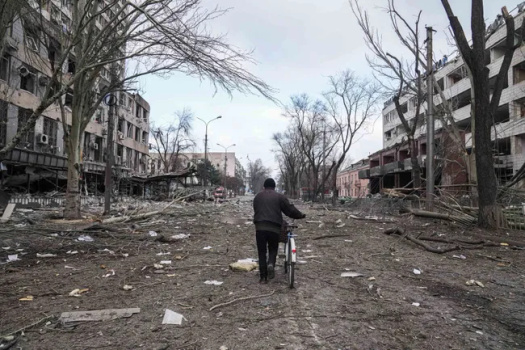
Almost all of the schools have been bombed. I was born and raised in Mariupol and I graduated from high school here. I went to Mariupol City Tech and Public School #28. That one was hit by a mortar, now there's a hole in the roof. The windows didn't break though because they are plastic. But my high school is completely destroyed. It was under artillery fire for a long time and now it’s full of holes and one wall is just gone.
Do I hate Russia? No. How could I? I have a bunch of close friends and relatives there. I’ve lived there, too, for three years. I don’t hate anybody on principle. Except maybe those cross-eyed gunners and blind pilots. If they’d been more accurate, maybe there would have been fewer civilian casualties. Do I blame anyone? Maybe the disenfranchised and cowardly Russians. I’m not afraid to travel through gunfire to go see my relatives while they’re too scared to go out in the streets in groups of more than three people.
Interview by Veronika Kuznetsova
Translated by Emily Laskin
(1) Context
In 2021, the average price for a pack of cigarettes in Ukraine was 47 hryvnias — that’s less than $2. Today, 200 hryvnias is equivalent to about $7.